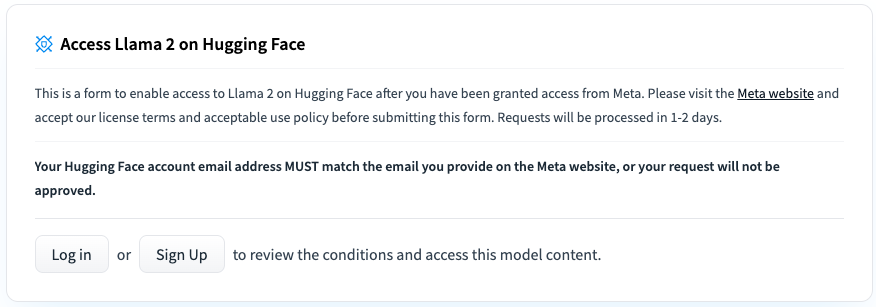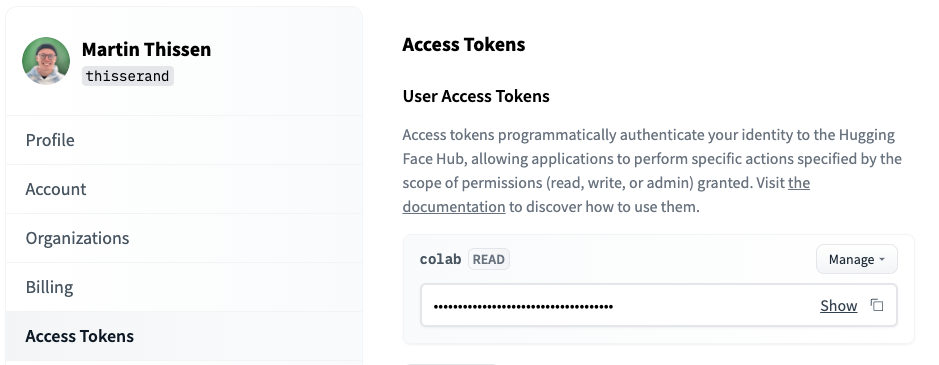Spaces:
Runtime error
A newer version of the Gradio SDK is available:
4.37.2
title: llama2_local
app_file: llama.py
sdk: gradio
sdk_version: 3.37.0
Llama2 on Your Local Computer
Run the new Llama2 and Llama2-Chat models on your local computer.
Getting Started
Installation
- Clone the repository:
git clone https://github.com/thisserand/llama2_local.git
cd llama2_local
- Install required dependencies:
pip install -r requirements.txt
Prerequisites
To be able to download the model weights and tokenizer from Huggingface, you firtst need to visit the Meta AI website and accept their License (my request got approved within 30 minutes). Make sure that you state the email address that you are also using for your Huggingface account. Once your request got accepted, you need to go to one of the Llama2 Huggingface repositories (e.g., the Llama2-7B model) and request access for there again, as can be seen in the following image (access should be granted right away):

Once you are all set with your access requests the last step is to login to your huggingface account in your current runtime. For this we will use the following command:
huggingface-cli login
You can find your Access Token here (https://huggingface.co/settings/tokens):

Windows
Make sure that you have gcc with version >=11 installed on your computer. Here are steps described by Kevin Anthony Kaw for a successful setup of gcc:
- CMake version cmake-3.27.0-windows-x86_64.msi installed to root directory ("C:")
- minGW64 version 11.0.0 extracted to root directory ("C:")
- set environment path variables for CMake and minGW64
- install visual studio build tools. It's way at the bottom under "Tools for Visual Studio" drop down list.
- In visual studio, check the "Desktop development with c++", click install.
Usage
Full Precision (Original)
Llama2-7B:
python llama.py --model_name="meta-llama/Llama-2-7b-hf"
Llama2-7B-Chat:
python llama.py --model_name="meta-llama/Llama-2-7b-chat-hf"
Llama2-13B:
python llama.py --model_name="meta-llama/Llama-2-13b-hf"
Llama2-13B-Chat:
python llama.py --model_name="meta-llama/Llama-2-13b-chat-hf"
Llama2-70B:
python llama.py --model_name="meta-llama/Llama-2-70b-hf"
Llama2-70B-Chat:
python llama.py --model_name="meta-llama/Llama-2-70b-chat-hf"
GPTQ Quantized
Llama2-7B:
python llama.py --model_name="TheBloke/Llama-2-7B-GPTQ"
Llama2-7B-Chat:
python llama.py --model_name="TheBloke/Llama-2-7b-Chat-GPTQ"
Llama2-13B:
python llama.py --model_name="TheBloke/Llama-2-13B-GPTQ"
Llama2-13B-Chat:
python llama.py --model_name="TheBloke/Llama-2-13B-Chat-GPTQ"
Llama2-70B:
python llama.py --model_name="TheBloke/Llama-2-70B-GPTQ"
Llama2-70B-Chat:
python llama.py --model_name="TheBloke/Llama-2-70B-Chat-GPTQ"
GGML Quantized
Llama2-7B:
python llama.py --model_name="TheBloke/Llama-2-7B-GGML" --file_name="llama-2-7b.ggmlv3.q4_K_M.bin"
Llama2-7B-Chat:
python llama.py --model_name="TheBloke/Llama-2-7B-Chat-GGML" --file_name="llama-2-7b-chat.ggmlv3.q4_K_M.bin"
Llama2-13B:
python llama.py --model_name="TheBloke/Llama-2-13B-GGML" --file_name="llama-2-13b.ggmlv3.q4_K_M.bin"
Llama2-13B-Chat:
python llama.py --model_name="TheBloke/Llama-2-13B-Chat-GGML" --file_name="llama-2-13b-chat.ggmlv3.q4_K_M.bin"